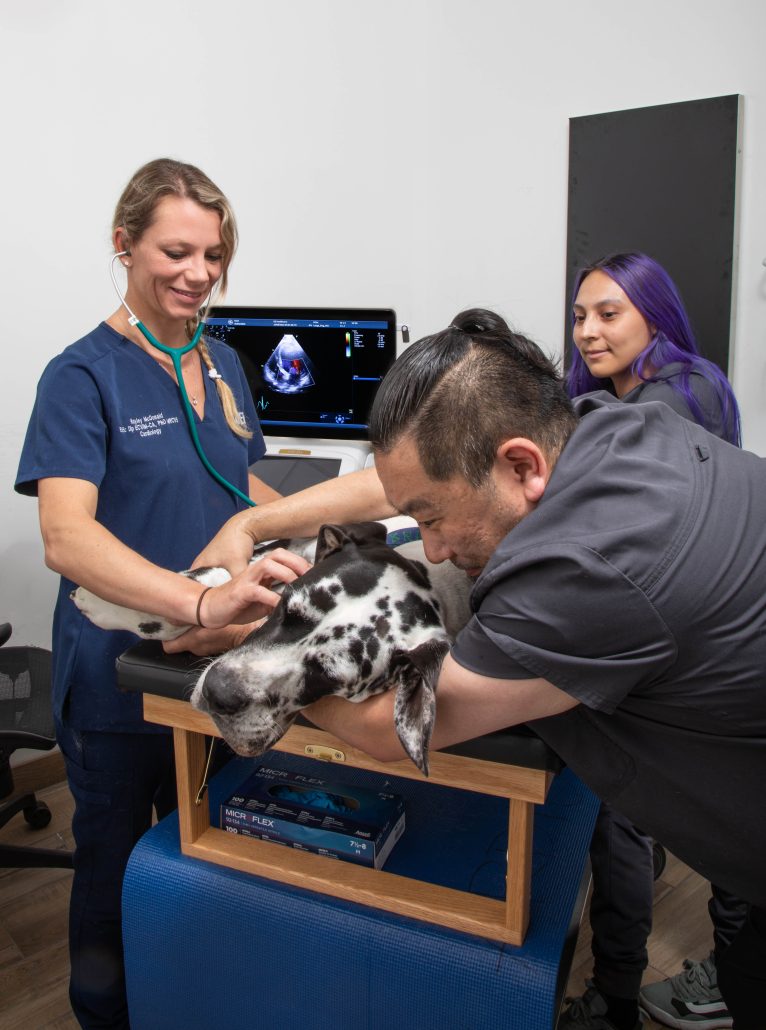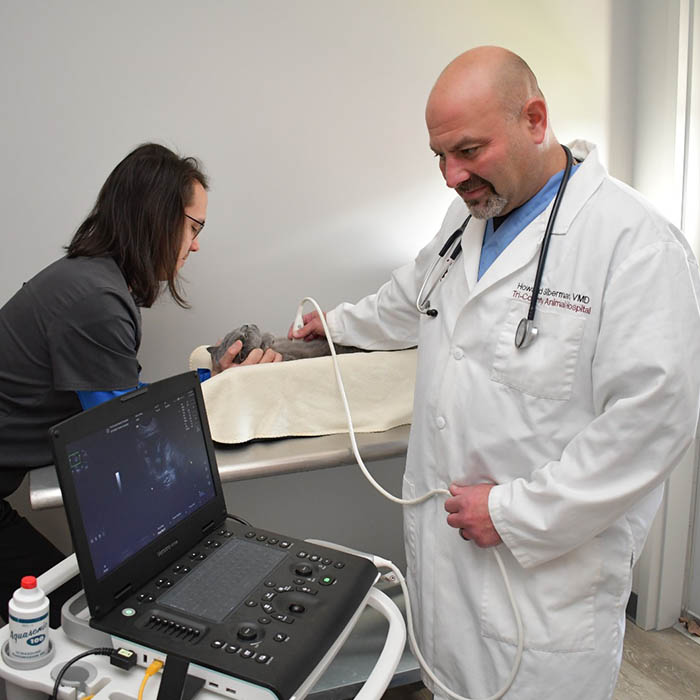Are CT Scans For Dogs Safe? Risks, Benefits, and What to Expect}
Checking Out the Necessary Providers Supplied by a Vet Cardiologist: Recognizing Ultrasound and CT Check Methods
Veterinary cardiologists play a vital role in the health of pets by identifying and dealing with different heart conditions. They utilize advanced imaging methods, such as heart ultrasound and CT scans, to provide accurate examinations. Each technique has its unique advantages and applications. Understanding these strategies is crucial for family pet owners seeking the finest look after their companions. What variables should family pet owners take into consideration when picking between these analysis devices?

The Duty of Vet Cardiologists in Pet Dog Healthcare
Veterinary cardiologists play a crucial duty in the healthcare of animals, focusing particularly on detecting and dealing with heart-related problems. They have specialized training that allows them to interpret complicated diagnostic tests and determine numerous cardiovascular concerns. These specialists utilize advanced techniques, such as echocardiography and electrocardiography, to evaluate heart function and structure accurately.Veterinary cardiologists additionally develop tailored therapy plans that may include medications, way of life adjustments, and, sometimes, surgical interventions. Their expertise includes enlightening family pet proprietors about heart health and wellness, highlighting the significance of routine examinations and early discovery of prospective problems. Partnership with basic veterinarians is crucial, as it ensures complete take care of animals with presumed heart problems. By offering specialized solutions, vet cardiologists considerably improve the lifestyle for pets and give assurance for their owners, reinforcing the relevance of heart health and wellness in overall pet health.
Common Cardiac Issues in Pet Dogs
Typical cardiac concerns in family pets can greatly influence their health and wellness and lifestyle. Heart whisperings, different types of cardiomyopathy, and genetic heart problems are amongst the most widespread problems that vets experience. Ultrasound For Dogs. Comprehending these issues is crucial for family pet proprietors to ensure timely medical diagnosis and suitable therapy
Heart Murmurs in Pets
Although heart murmurs can be a resource of issue for pet dog owners, they are not always a sign of serious health and wellness issues. A heart murmur is an irregular audio produced by unstable blood circulation within the heart. In pet dogs, these murmurs can be triggered by numerous factors, including hereditary heart issues, valve concerns, and even anxiety throughout evaluations. Lots of family pets with heart murmurs lead typical lives without significant health and wellness influences. To determine the underlying reason, veterinary cardiologists usually utilize diagnostic methods such as echocardiograms and Doppler ultrasounds. Early discovery and analysis are essential, as they might assist take care of any potential cardiac issues successfully. Family pet owners are urged to consult their veterinarian for a detailed assessment if a heart murmur is found.
Cardiomyopathy Kind Explained
Cardiomyopathy includes a group of illness impacting the heart muscle mass, causing jeopardized cardiac function in animals. The most common types include expanded cardiomyopathy (DCM), hypertrophic cardiomyopathy (HCM), and limiting cardiomyopathy (RCM) DCM mostly impacts canines, causing the heart to expand and compromise, which diminishes its capacity to pump blood properly. On the other hand, HCM is a lot more prevalent in cats, identified by the enlarging of the heart wall surfaces, typically resulting in blocked blood circulation. RCM, though less usual, takes place when the heart muscle mass ends up being rigid, restricting its capability to loaded with blood. Each kind offers one-of-a-kind obstacles in medical diagnosis and treatment, necessitating specialized vet cardiological examination to ensure peak management and care for affected pet dogs.
Hereditary Heart Defects
Hereditary heart problems stand for a substantial group of heart issues in pet dogs, distinct from gotten conditions such as cardiomyopathy - Cancer Veterinary Near Me. These flaws are structural problems present at birth, influencing the heart's typical feature. Common kinds consist of patent ductus arteriosus, ventricular septal issues, and pulmonic stenosis. Signs and symptoms might vary commonly, ranging from moderate to extreme, and can include workout intolerance, coughing, and difficulty breathing. Early diagnosis via advanced imaging methods like ultrasound is important for reliable management. Vet cardiologists play a vital role in determining these problems and recommending suitable therapy options, which may consist of clinical monitoring or surgical intervention. Acknowledging genetic heart defects enables far better end results and enhanced lifestyle for impacted pet dogs
Understanding Cardiac Ultrasound: Just How It Works
A considerable variety of veterinary practices now utilize heart ultrasound as an important diagnostic tool for examining heart health in animals. This non-invasive method makes use of high-frequency acoustic waves to create photos of the heart's structure and function. During the procedure, a veterinary professional applies a gel to the animal's chest and uses a transducer to discharge ultrasound waves. These waves jump off the heart and bordering frameworks, producing real-time pictures on a monitor.Veterinarians can analyze various aspects of heart wellness, consisting of chamber dimension, wall surface movement, and valve feature. Furthermore, cardiac ultrasound permits the detection of abnormalities such as fluid buildup and genetic heart flaws. This method is essential for detecting problems that may not be visible through basic radiographs. By providing detailed details regarding the heart's composition and performance, cardiac ultrasound help in creating efficient treatment strategies for pets struggling with cardiovascular disease.
The Importance of CT Checks in Identifying Heart Conditions
Just how do CT scans improve the diagnosis of heart problems in veterinary medicine? CT scans provide thorough cross-sectional pictures of the heart and surrounding frameworks, enabling veterinarians to picture complicated physiological connections. This imaging technique is specifically helpful in identifying genetic heart problems, heart tumors, and abnormalities in capillary. By utilizing innovative imaging algorithms, CT scans can analyze heart chamber sizes and feature, using a thorough sight that may be tough to attain with conventional methods.Additionally, CT angiography can visualize blood flow and determine locations of stenosis or blockage, which is important for intending potential interventions. The rate and precision of CT scans likewise facilitate quick diagnoses, important in emergency circumstances. Inevitably, the consolidation of CT checks right into veterinary cardiology considerably enhances the accuracy of medical diagnoses, making it possible for targeted treatment plans and enhancing patient results for pets try here experiencing heart disease.
Contrasting Ultrasound and CT Check Strategies
While both ultrasound and CT scans are indispensable devices in vet cardiology, they offer distinct advantages and restrictions that affect their usage in detecting heart disease. Ultrasound, or echocardiography, provides real-time imaging of the heart's structure and function, enabling veterinarians to assess heart chambers, valves, and blood flow. It is especially efficient for reviewing conditions like coronary infarction and cardiomyopathy. Nevertheless, ultrasound might be you could try here restricted in envisioning certain anatomical structures due to patient size or obesity.In contrast, CT scans offer detailed cross-sectional photos of the heart and surrounding tissues, making them ideal for identifying structural abnormalities, lumps, or vascular issues. Although CT scans provide extensive understandings, they require sedation and might include radiation exposure. Ultimately, the selection in between ultrasound and CT checks depends on the specific scientific situation, the client's problem, and the details needed for an exact diagnosis.
Therapy Choices Available Via Veterinary Cardiology
Veterinary cardiology provides an array of therapy options tailored to address numerous heart conditions in pets. Treatment strategies commonly begin with way of living adjustments, consisting of diet plan changes and exercise adjustments, focused on improving general heart health. Medicines play a vital duty, with cardiologists prescribing medications such as diuretics, beta-blockers, and ACE inhibitors to improve and handle signs and symptoms cardiac function.In more extreme situations, interventional procedures, such as balloon valvuloplasty or stent positioning, may be required to ease blockages or enhance blood circulation. For sure congenital heart issues, medical alternatives may be discovered to fix architectural concerns. Additionally, continuous tracking and follow-up care are crucial components of a detailed treatment plan, enabling prompt modifications based upon the pet dog's feedback to therapy. In general, veterinary cardiology focuses on supplying reliable, individualized like optimize the health and wellness and wellness of pet clients with heart problems.
Just how to Prepare Your Pet for a Cardiac Assessment
Preparing an animal for a cardiac examination is necessary to assure accurate outcomes and a smooth procedure. Proprietors need to initially set up the consultation with the vet cardiologist and review any kind of details needs or problems. It is suggested to hold back food for at the very least 12 hours before the examination, as this aids boost imaging top quality during procedures like ultrasound or CT scans.Additionally, maintaining a calm setting on the day of the consultation can help in reducing the animal's stress and anxiety. It is helpful to bring along any type of relevant medical documents, consisting of previous tests and medications (Ultrasound For Dogs). Proprietors must likewise make sure that their pet fits and leashed during transport to the facility. Acquainting themselves with the assessment procedure can relieve fears and aid in asking informed inquiries during the assessment. By following these actions, owners can contribute greatly to the effectiveness of the heart evaluation
Regularly Asked Questions
The length of time Does a Heart Ultrasound or CT Check Take?
The duration of a heart ultrasound generally varies from 30 to 60 minutes, while a CT scan might take approximately 15 to 30 mins. Elements such as the individual's condition can influence these time price quotes.

Exist Any Kind Of Threats Associated With These Diagnostic Procedures?

Can I Keep With My Pet Dog Throughout the Treatment?
The veterinary facility's policy typically determines whether pet dog proprietors can continue to be during procedures. While some clinics urge proprietor existence for convenience, others might need separation to assure safety and security and excellent problems for diagnostic imaging.
Just how much Do These Analysis Tests Generally Cost?
The prices of diagnostic examinations, such as ultrasound and CT scans, usually differ based on area and facility. Generally, rates range from a few hundred to over a thousand bucks, reflecting the intricacy and innovation involved.
What Is the Recuperation Process After a Heart Assessment?
The recovery procedure after a cardiac examination involves checking the family pet for any kind of immediate responses, making certain comfort, and restricting physical activity. Veterinarians normally provide post-evaluation guidelines to guide pet dog owners throughout this necessary recovery duration. Heart murmurs, numerous kinds of cardiomyopathy, and hereditary heart issues are among the most common problems that veterinarians experience. A heart whispering is an unusual audio produced by stormy blood circulation within the heart. Cardiomyopathy incorporates a group of illness influencing the heart muscle, leading to endangered cardiac function in animals. Genetic heart issues represent a substantial group of cardiac problems in family pets, distinctive from acquired conditions such as cardiomyopathy. Ultrasound, or echocardiography, supplies real-time imaging of the heart's framework and feature, Get More Information allowing veterinarians to examine heart chambers, shutoffs, and blood circulation.